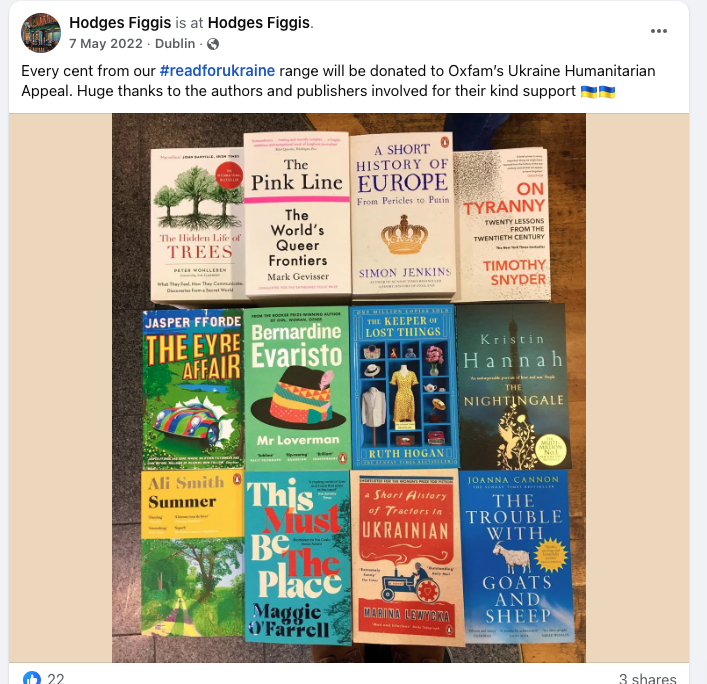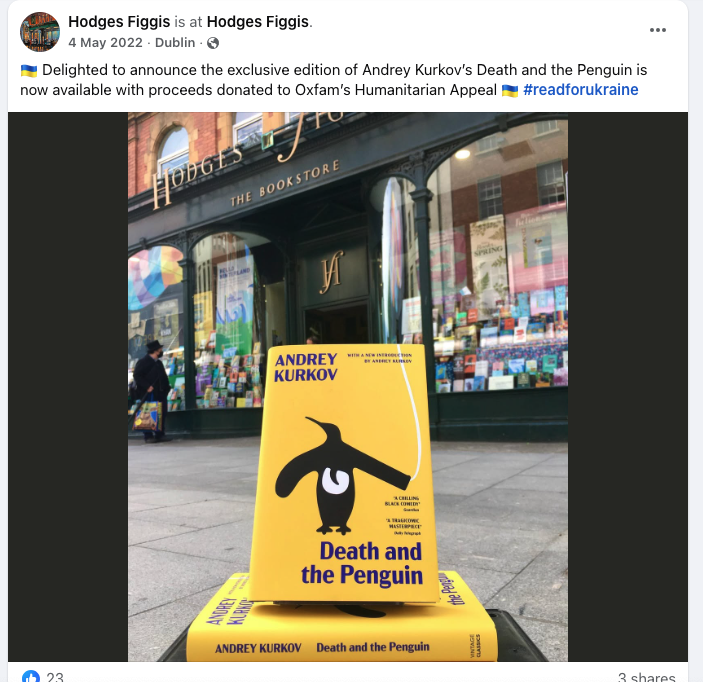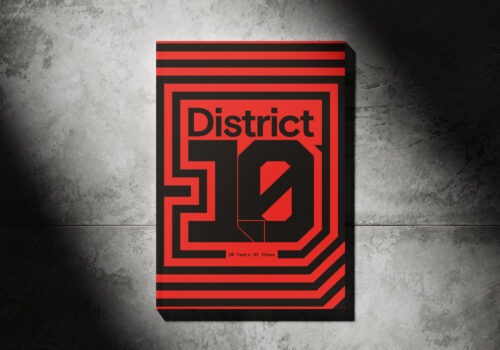Hodges Figgis Staff Accuse Waterstones of Suppressing Solidarity With Palestine
Words: Izzy Copestake
Image: WikiCommons
When John*, an employee at Hodges Figgis, wore a small Ireland pin in Palestine’s flag colours on St Patrick’s Day weekend, he didn’t think much of it. “[I thought] this was keeping with the spirit of celebrating Paddy’s Day,” he told District. But within a week, he says he was called into a disciplinary meeting. John would later be dismissed from the company on grounds, he believes, is due to his pro-Palestine stance.
He is one of four current and former staff members who have spoken directly to District about what they describe as a pattern of censorship, double standards, and disciplinary action in response to expressions of support for Palestine. Hodges Figgis is currently owned by UK-based chain Waterstones and has been since 2011 and is in turn owned by the hedge fund Elliot Investment Managers.
Staff we spoke to say they were disciplined, asked to remove Palestine pins, or pushed out for questioning company policy on the matter. At the same time, they point to previous public support from the bookshop for Ukraine that faced no such restrictions. Waterstones has denied any suppression of political views, stating that it follows consistent HR procedures across all stores (full statement below).
John went on to tell District that he was initially given a verbal caution for wearing a Palestine pin, despite having worn a Ukraine pin before “without issue” and even “observed by management”. Later, another manager told him to remove the badge, but John says no clear or formal policy was ever presented to staff, and this lack of consistency made it unclear what rules actually applied.
The issue escalated on St. Patrick’s Day weekend, when John wore his small badge. He said some tourists appeared visibly uncomfortable, though they didn’t raise it with staff. A few days later, he says he was summoned to the office and told that a complaint had been made to Waterstones head office. According to John, “the word ‘antisemitism’ was used.” A formal investigation followed, resulting in his first disciplinary warning. He stopped wearing the pin after that.
The second incident concerned a book launch for Catastrophe: Nakba II by Irish author Fintan Drury. The Nakba, which took place between 1947 and 1949, saw over 15,000 Palestinians killed and more than 700,000 forcibly displaced from their homeland during the creation of the state of Israel. Drury’s book has been described as an “insightful and moving analysis of the decades-long oppression of the Palestinian people by Israel.”
John was helping set up the event, which was a routine responsibility of his at the time, when he says a manager quietly told him that the publisher’s promotional banners should not be used because they wanted to “tone down” the event. John reportedly then challenged this and was then called up on formal disciplinary charges for “insubordination”. Despite pleading his case, he received his second caution. “The book sold close to 150 copies that night alone,” he said. “It was evident that a highly topical book by an Irish author… was being treated differently due to the subject matter it dealt with.”
“It was evident that a highly topical book by an Irish author… was being treated differently due to the subject matter it dealt with.”
Some weeks later, John shared some of his frustrations about himself and fellow staff members being disciplined for wearing Palestine pins on his personal Instagram page, he said this is what resulted in his dismissal.
Other staff report facing similar pressures. Clara* resigned on the spot after being told to remove a badge reading “Saoirse don Phalaistín” (Freedom for Palestine). Management cited safety concerns and said the pin could be offensive to some customers. “I was told I could wear my pin any other time, but not while working and representing Hodges Figgis,” Clara said. “I then resigned verbally and stated that I could not in good conscience continue to work for a shop that suppresses and punishes its employees for expressing their support for Palestine.”
“I could not in good conscience continue to work for a shop that suppresses and punishes its employees for expressing their support for Palestine.”
She added that staff had previously worn pride pins, Ukraine symbols, and poppies without incident. Despite claims from management that all political expression is now treated equally, Clara believes the rules were “selectively enforced” and a blanket ban on political symbols was enforced in response to Palestine-related symbols. “When I started working at Hodges Figgis, the shop was loudly and openly showing and stating its solidarity and support for Ukraine. It’s interesting and particularly shameful that similar solidarity and support is not extended to Palestine.”
Indeed, in April 2022, Waterstones launched a scheme to raise £1m for Ukraine which involved Hodges Figgis. Since Russia’s invasion of Ukraine, Hodges Figgis have used their Facebook page to post a number of posts in solidarity with Ukraine and to raise money. One post reads “🇺🇦 Delighted to announce the exclusive edition of Andrey Kurkov’s Death and the Penguin is now available with proceeds donated to Oxfam’s Humanitarian Appeal 🇺🇦 #readforukraine”

In May 2023, Hodges Figgis hosted the launch of a selection of short stories and poems titled “We Stand With Ukraine”. Part of the promotion for the launch included large Ukrainian flags and images of Ukrainian people who had been injured by Russia’s attacks on the country.

Tom*, a current employee, also confirmed that the environment around political expression changed abruptly. “Until people started wearing Palestine badges a few months ago, staff were allowed to wear any badges or pins they wanted,” they said. “It’s only when people started showing support for Palestine in particular that there was a blanket ban.” He also noted that staff were warned in advance of the Nakba II launch not to show support for Palestine and instructed to remain “neutral” if approached by customers or journalists.
“Until people started wearing Palestine badges a few months ago, staff were allowed to wear any badges or pins they wanted.”
Other employees declined to speak on the record due to fears of losing their jobs, but Tom said that other colleagues he worked with had received formal warnings and were at risk of being fired.
Natalie*, who left the shop earlier this year after two years, described a climate of hypocrisy and pressure. “When it came to Palestine, we were told to keep our politics to ourselves,” she said. “But we had previously hosted an event focused on Ukraine that featured refugees, performers, and even Baltic diplomats giving speeches condemning Russia.”
“When it came to Palestine, we were told to keep our politics to ourselves,”
Natalie said she had initially seen the shop’s large Palestine literature section as a positive, a sign that public interest in the issue was growing. But over time, she said it became harder to reconcile this with what she saw happening to staff. “Books like On Palestine and The Hundred Years’ War on Palestine were some of the bestsellers in the history section. But then management began cracking down on staff wearing small badges. I began to feel extremely uncomfortable about how much the company was profiting off of this literature.”
When asked by District to clarify its policy on staff displaying political symbols, and whether it had changed in recent years, Waterstones responded by insisting that it has always adhered to what it called “common sense and decency.”
“Waterstones, and equally Hodges Figgis, follow consistent HR processes,” a spokesperson said. “As regards to contentious social or political issues, we ask that common sense is followed by our employees. Waterstones has always been consistent in this adherence to common sense and decency. Current management has been in place since 2011 and since that time has sought to allow reasonable expression of views by booksellers whilst also respecting our customers, and indeed the wider communities in which our bookshops are placed.”
On the question of whether employees had been disciplined or dismissed for wearing Palestine pins, Waterstones was unequivocal in denying the latter: “The representation that anyone has been, or ever will be, sacked for expressing support for Palestine by wearing a badge, or other reasonable manner, is wrong.” However, the company did not directly address whether disciplinary action short of dismissal, such as official warnings or investigations, had taken place in such cases.
The company declined to comment on any individual cases of staff discipline, citing confidentiality, but stated: “We do not comment on individual cases of HR discipline for obvious reason and, as already noted, as an employer we always follow due process in all HR matters.”
Regarding the internal handling of Catastrophe: Nakba II launch, Waterstones stated that “We can confirm that the event was promoted in line with normal promotional practices and was advertised in the bookshop with posters and on the Hodges Figgis events website. There were approximately 100 attendees on the night and the bookshop received positive feedback.”
Waterstones also did not directly address whether a formal policy banning political symbols was introduced in recent months, and how such a policy was communicated and enforced.
As one of Ireland’s most historic bookshops, Hodges Figgis has long been a space where political thought is central. The shop profits from sales from titles on decolonisation and liberation struggles and hosts regular events which tackle topical global issues. Waterstones have remained firm in their stance denying the allegations made. However, for the employees who’ve reportedly been disciplined for wearing pins, have challenged inconsistencies, or walked away in protest, the crackdown on Palestine-related expression has left them questioning the principles at play.
At a time when bookstores are increasingly seen as spaces where authors can express themselves freely amidst increased censorship, particularly in the UK, the question remains: who gets to define what counts as political, and who gets punished for it?
*Names have been changed to protect the identities of those who have given statements. All allegations are as described by current and former staff. Waterstones’ full statement appears below.
Full Statement From Waterstones:
“Waterstones, and equally Hodges Figgis, follow consistent HR processes.
As regards to contentious social or political issues, we ask that common sense is followed by our employees.
Waterstones has always been consistent in this adherence to common sense and decency. Current management has been in place since 2011 and since that time has sought to allow reasonable expression of views by booksellers whilst also respecting our customers, and indeed the wider communities in which our bookshops are placed.
The representation that anyone has been, or ever will be, sacked for expressing support for Palestine by wearing a badge, or other reasonable manner, is wrong. We do not comment on individual cases of HR discipline for obvious reason and, as already noted, as an employer we always follow due process in all HR matters.
We can confirm that the event was promoted in line with normal promotional practices and was advertised in the bookshop with posters and on the Hodges Figgis events website. There were approximately 100 attendees on the night and the bookshop received positive feedback.





